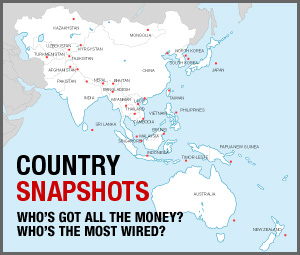
Taiwan 
The next decade will be marked by much uncertainty about Taiwanese sovereignty. After sixty years of ‘status quo’ in the Taiwan Strait, Taiwan under President Ma Ying-jeou is seen by many as drifting into China’s sphere of influence. The Hong Kong-born Ma took office in 2008 vowing to improve relations with Beijing, and has done so by signing various cross-strait pacts, including a possible economic cooperation framework agreement in early 2010.
Amid these rapid changes, Ma’s opponents fear that he is causing irreparable damage to Taiwan’s sovereignty by increasing the nation’s dependence on China, which could have political implications — something that Beijing has made no effort to conceal.
Taiwan’s opposition Democratic Progressive Party argues that negotiations between Ma’s administration and the Chinese Communist Party lack transparency, that the legislature has been sidelined and that public apprehensions about the political and economic impacts of rapprochement have been ignored. As rumors of a ‘peace treaty’ and a possible Ma-Hu Jintao meeting in 2011 intensify, domestic opposition to Ma’s China policies is rising and risks boiling over.
With Hu stepping down in 2012 and Taiwan holding presidential elections the same year, Beijing could apply pressure for a quick political settlement, which would severely undermine Ma’s credibility vis-à-vis a Taiwanese polity that largely favors the status quo and increasingly identifies itself as Taiwanese first, Chinese second. If Ma is re-elected, we can expect moves toward unification, accompanied by an erosion of freedoms and liberties. If the pro-independence DPP stages a comeback, Beijing could show its impatience by using its military to settle the matter, or exploit its growing economic and political clout to isolate the island.
Despite ‘warmer’ ties, Taiwan’s ability to defend itself has suffered from delays in US weapons deliveries and Washington’s refusal to sell pre-approved items such as advanced F-16s, and military analysts warn that the balance of power in the Taiwan Strait has shifted in Beijing’s favor.
Whether Beijing and Washington become ‘strategic allies’ or competitors in the next ten years, and whether the US remains committed to defending Taiwan, will have a decisive impact on how this plays out.
J. Michael Cole is as an editor and columnist at the ‘Taipei Times’ and a former analyst at the Canadian Security Intelligence Service. He is the author of ‘Democracy in Peril: Taiwan’s struggle for survival from Chen Shui-bian to Ma Ying-jeou.’










